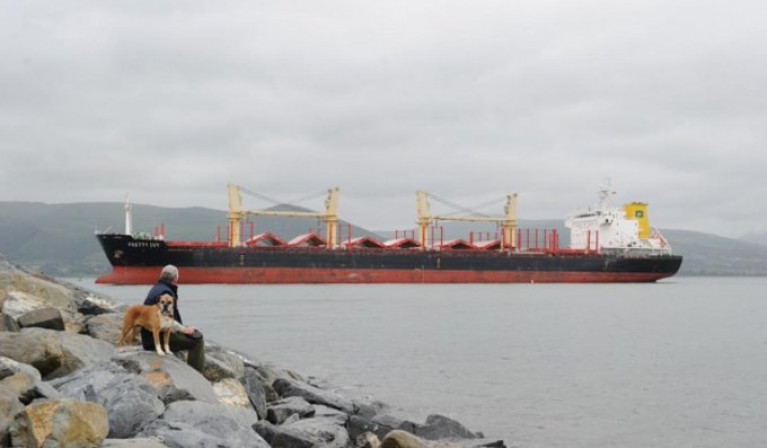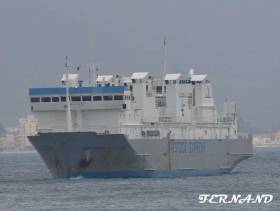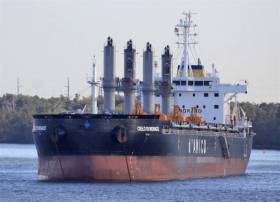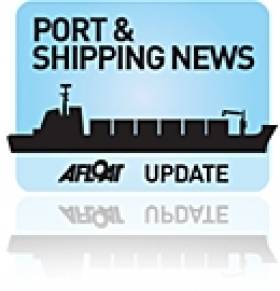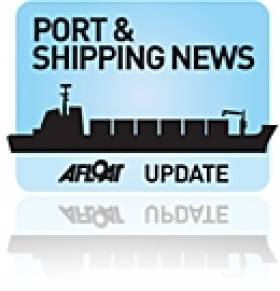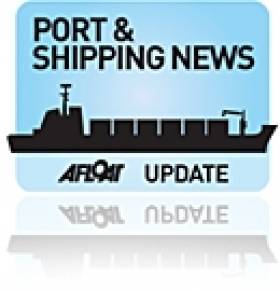Displaying items by tag: Greenore Port
On Carlingford Lough is Greenore Port which has seen a 31% increase in the number of vessels arriving to the port between 2019 and 2021, with the gross tonnage increasing by a quarter, according to the latest Central Statistics Office figures.
The north Co. Louth port saw 173 arrivals to the port in 2021, up from 134 in 2020 and 132 in 2019.
Arrivals of Dry Bulk vessels increased by from 79 in 2019, to 97 in 2020, and 121 in 2021, representing an increase of 53% since 2019. In terms of gross tonnage, there was an increase of 254,000 tonnes or 28% since 2019.
More from the Dundalk Democrat on the CSO figures.
Afloat adds Greenore Port is unique as it is the only privately owned port in Ireland and which is a wholly owned subsidiary of Doyle Shipping Group.
The port is also the Republic’s only deep-water port outside of Dublin Port and located on the east coast of Ireland and can cater for part-laden vessels of up to 60,000dwt.
Cattleship Loads 3,000 Livestock Departs Greenore Port for Turkey
#CattleShip - In monitoring Irish Sea shipping movements Afloat.ie noted a livestock carrier that had departed Greenore Port, Co. Louth today is bound for Turkey, writes Jehan Ashmore.
The purpose built livestock carrier Brahman Express with a cattle capacity pen area of 4,758 m2 spread across five decks, had passed the Codling Bank buoy offshore of Wicklow Head this afternoon.
The Philippine-flagged vessel built in 2002 and operated by Livestock Express B.V. based in Breda, The Netherlands is part of the Vroon Group B.V. They have a diverse fleet of around 200 vessels.
It transpires that the 133m long Brahman Express according to The Irish FarmersJournal.ie had arrived back in Greenore Port on Monday evening. The 7,700 gross tonnage vessel was to load a second fresh shipment of live export cattle.
The live exporter, Viastar added the Farmers Journal writing on Monday, had expected to load 3,000 weanlings on the ship this week for the Turkish market. Viastar is expected to fill two further shipments to Turkey this year under a contract running until the end of December.
Afloat adds that Brahman Express which when in ballast is capable of 16 knots, is bound for the Turkish port of Mersin.
Poor Safety Procedures Raised In Interim Report On Greenore Bulker Incident
#MCIB - Poor mooring configuration and adherence to safety procedures have been identified as main factors in the interim report on an incident involving a 'handy size' bulker at Greenore Port last year.
As previously reported on Afloat.ie, the MV Cielo di Monaco was detained at the Co Louth port by Irish authorities on 30 September 2015 under the Paris MoU as a safety measure, with suspected damage to its 180m-long hull.
Further investigation of the vessel found an ingress of water in the forepeak blast tank that caused it to go aground forward, with subsequent diver inspection revealing damage to the shell plating and frames, according to the interim report from the Marine Casualty Investigation Board (MCIB).
Temporary repairs were carried out before the vessel sailed on the following month, with no reports of pollution or injury to any persons.
The MCIB notes that the findings and conclusions in the final report may not reflect the contents of the interim report if additional information or evidence is revealed.
Detained 'Handy Size' Bulker Remains Docked at Greenore Port
#DetainedBulker - A 39,200dwt bulker is understood to remain under detention in Greenore having docked at the Co. Louth port at the end of last month, writes Jehan Ashmore.
The Maltese-flagged Cielo di Monaco, a 'Handy Size' open shaped hatch bulker which arrived from Sheerness, Kent was detained by Irish authorities on 30 September. It is also understood the vessel may have damage to its 180m long hull.
According to the Paris MoU, the 2014 built bulker is listed as detained by the organisation that aims to eliminate the operation of sub-standard ships though a harmonized system of port state control.
Ireland is a member state of Paris MoU and carried out the detention of the bulker managed by d'Amico Dry, a subsidiary of the Italian owned d'Amico group, which also has a large product tankers fleet. The subsidiary is domiciled in Dublin and has charter operations based in other locations among them Monaco.
A another bulker similar to the Cielo di Monaco, the 37,000dwt Cielo di San Francisco as previously reported on Afloat.ie went aground on a Dublin Bay sandbank in 2013. The Italian flagged bulker was re-floated near the Kish Lighthouse. On that occasion the 2011 built vessel was making a maiden call to Ireland, firstly with an arrival to Cork's Ringaskiddy terminal.
Last month, Afloat reported that d'Amico Tankers Ireland Ltd had announced an order for the construction and sale of two 75,000dwt long-range product tankers.
Greenore Port Acquired by Burke Shipping Group
#GreenorePort - Burke Shipping Group, the principal operating subsidiary of the Doyle Group, has The Irish Times writes acquired Greenore Port in Co Louth.
Previously the port was jointly owned by One51 and the state-owned Dublin Port Company. The price Burke Shipping paid for the port is not known but it is thought to be in the region of €5 million. Burke did not respond to requests for comment.
The company, which employs 300 people and has offices in all major Irish ports, is understood to plan to invest a substantial sum in improving Greenore. It will be the first significant port to be entirely privately owned in the Republic.
Burke Shipping plans to target the container and bulk shipping market and compete with the Dublin Port Company and other ports for this business.
Greenore is strategically located next to the Dublin-Belfast economic corridor, so it is capable of servicing both cities. For more on the acquisition by the group click HERE.
The group as previously reported were a potential bidder back in August.
More recently an investment in port infrastructure at their Dublin Port container terminal has further consolidated the company's business in the lo-lo sector.
Burke Shipping Group Bids for Greenore Port
#GreenorePort – The Irish Times reports that the Burke Shipping Group, has emerged as a bidder in the final stages of the race for Greenore port in Co Louth.
It is one of three remaining bidders for the port, which as previously reported is jointly owned by the investment company One51 and the State-owned Dublin Port Company.
Warrenpoint Harbour, which recently announced its pre-tax profit doubled to £850,000 (€1.07 million) in 2013, is also among the final bidders for the port. The third bidder is believed to be a family-owned company with interests in transport.
Greenore is strategically located next to the Dublin-Belfast economic corridor, so it is capable of servicing both cities, meaning its new owner will be watched out for closely by Irish exporters.
For much more on this story click HERE.
Dublin Port and One51 to Sell Greenore Port
#GreenorePort – Today's Irish Times reports that State-owned Dublin Port Company and investment company One51 are on the brink of selling Greenore Port in Co. Louth to a new owner for a figure in the low single-digit millions.
The sale of the strategically located port on Carlingford Lough is being handled by IBI Corporate Finance, which is in the final stages of closing the sale of the port.
The port is owned equally by Dublin Port Company and One51 via a company called Renore Ltd, which was set up to acquire the operations of the port in April 2002. To read more of this development, click the article Here.


























